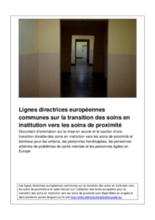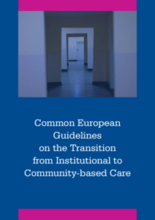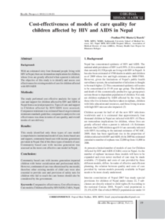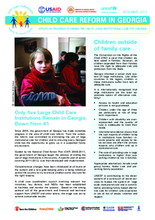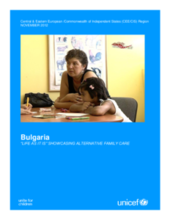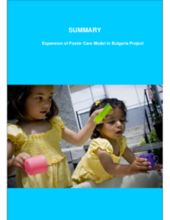Demographic Data
|
Sources: World Bank, UNDP, UNAIDS, DHS 2013 |
Displaying 12711 - 12720 of 14390
Document d’orientation sur la mise en œuvre et le soutien d’une transition durable des soins en institution vers les soins de proximité et familiaux pour les enfants, les personnes handicapées, les personnes atteintes de problèmes de santé mentale et les personnes âgées en Europe.
The Common European Guidelines on the Transition from Institutional to Community-based Care (‘the Guidelines’) provide practical advice about how to make a sustained transition from institutional care to family-based and community-based alternatives for individuals (including children) currently living in institutions and those living in the community, often without adequate support.
Hope and Homes for Children, in partnership with the Ministry of Gender and Family Promotion (MIGEPROF), has conducted a national survey of all institutions for children in Rwanda to obtain an accurate picture of the current institutional system and the children living within it which can be used to inform decision-making regarding the implementation of the reform strategy and provide a baseline against which progress can be measured in the future.
Although the relationship between child sexual abuse and mental disorders life has been well established, the health consequences of other forms of child maltreatment, including physical abuse, emotional abuse, and neglect have not been systematically examined. This study summarizes the evidence relating to the possible relationship between child physical abuse, emotional abuse, and neglect, and subsequent mental and physical health outcomes.
This inter-agency paper was written by Family for Every Child, Better Care Network, Consortium for Street Children, Save the Children, SOS Children’s Villages, and World Vision, for submission to the United Nations consultation: ‘Health in the Post-2015 Development Agenda.’ It examines the links between child protection and health and argues for a continuing focus on health and child survival that encompasses particular goals and indicators on children’s protection.
This research study aimed to identify and assess the cost effectiveness for existing models of care for children affected by HIV and AIDS in Nepal. The study performed a cost effective analysis for three types of care models in order to provide program managers and childcare professionals comparative economic evidence of the cost of caring for these children.
This research paper provides a brief overview of the Vietnam Babylift and of a more recent child abduction attempt in Chad. Then, turning to the history of child abduction and adoption history in Latin America, the paper presents the conflicts of El Salvador and Argentina and discusses ‘living disappeared’ children – those who disappear into adoption networks during war. The research explores the post-conflict social realities in both nations. The role of the social worker and specific practices are identified and discussed in context of generalist social work practice.
The document highlights the recent child care reform in Georgia under the partnership of the Ministry of Labor, Health, and Social Affairs of Georgia and UNICEF and provides an update on progress of ending the use of large institutions care for children.
This report gives an overview of the documentary reality TV series, “Life as it is-foster families,” which UNICEF in Bulgaria launched in 2010 as a part of its agenda to stop children under 3 years of age from being placed in institutions and to close the infant homes for institutional care.
This summary report describes the project UNICEF has undertaken with the government of Bulgaria to establish a nationwide regional approach to foster care development based on its pilot experience. The project included a national public awareness campaign, establishment of specialized foster care services, and capacity building of the statutory child protection bodies.

